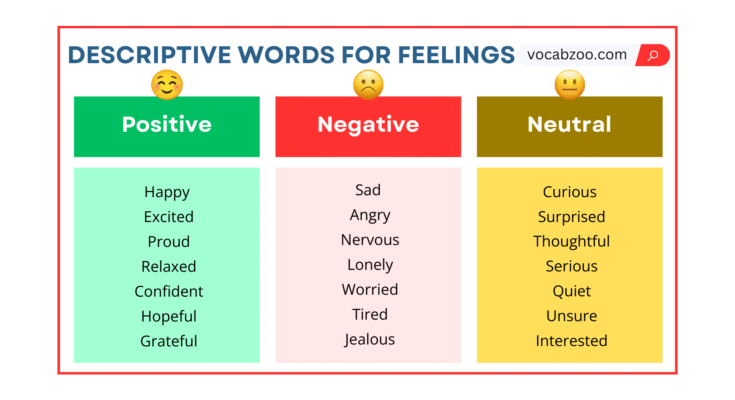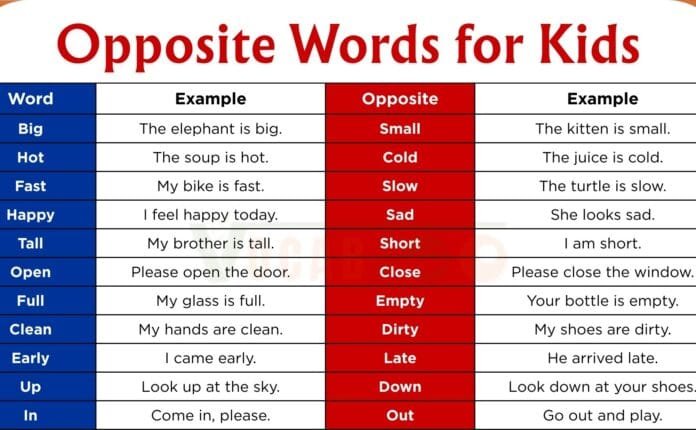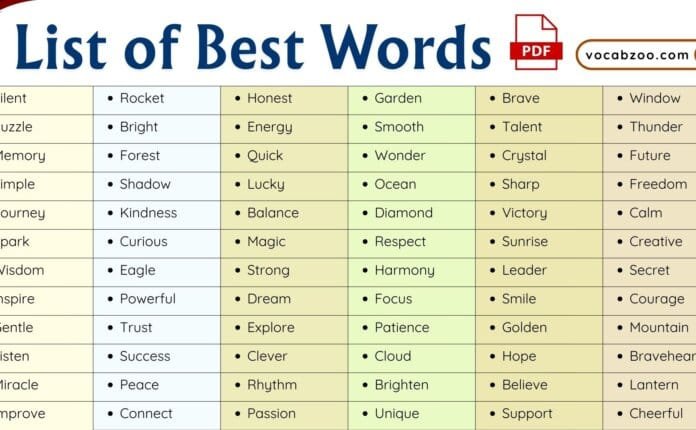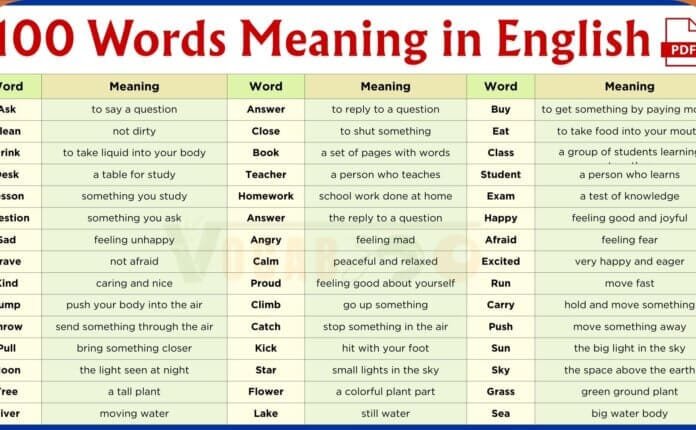Talking about emotions is an important part of English Vocabulary, and learning Descriptive Words for Feelings in English with Examples helps you express yourself clearly. In this blog post, you will see words that describe different emotions, along with examples, making it easier to learn and remember them. Knowing these words improves speaking, reading, and writing skills, and allows you to share experiences, understand stories, and communicate your feelings effectively. Using descriptive words for feelings makes your English more expressive and meaningful.
What Are Descriptive Words for Feelings?
Descriptive words for feelings are words that tell us how a person feels inside. These words can be positive, negative, or neutral. By using them, you can describe happiness, sadness, fear, excitement, and many other emotions.
In short: Descriptive feeling words show emotions in a clear and simple way.
Common Descriptive Words for Feelings
| Positive Feelings | Negative Feelings | Neutral Feelings |
|---|---|---|
| Happy | Angry | Curious |
| Excited | Sad | Surprised |
| Calm | Nervous | Thoughtful |
| Proud | Lonely | Quiet |
| Cheerful | Tired | Serious |
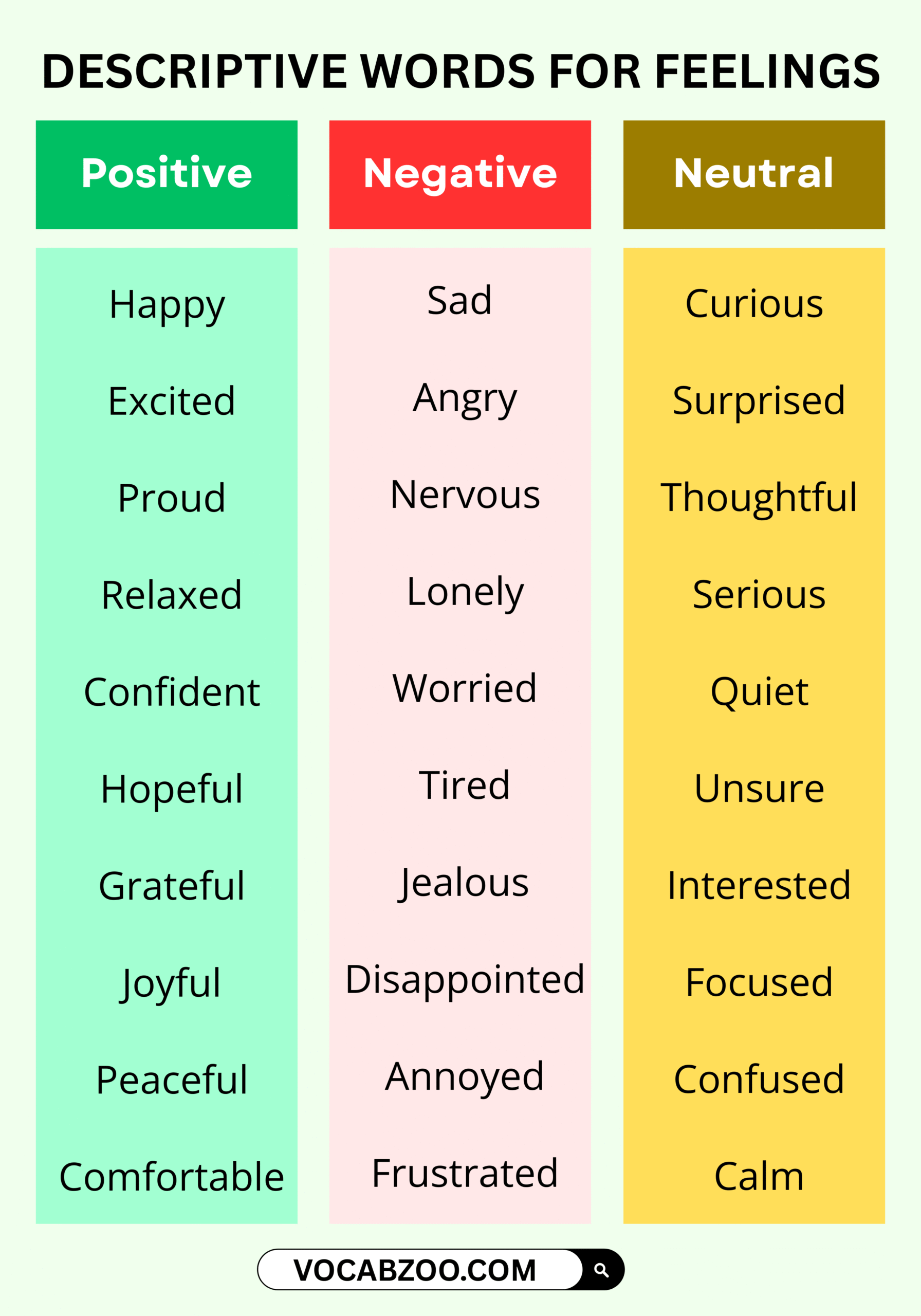
Descriptive Words to Describe Someone’s Feelings
Here’s the list of all the descriptive words that are used to describe someone’s feelings in different contexts and situations. Learning these words will make your English more natural and confident.
1. Positive Feelings Words
These words show good and happy emotions.
Happy – feeling good and pleased.
- Synonyms: joyful, glad, cheerful, delighted
Excited – feeling strong happiness about something coming.
- Synonyms: thrilled, eager, overjoyed, enthusiastic
Proud – feeling good about your own or someone’s success.
- Synonyms: honored, pleased, satisfied, dignified
Relaxed – feeling calm and free from stress.
- Synonyms: calm, peaceful, easy, rested
Confident – feeling sure about yourself and your abilities.
- Synonyms: self-assured, positive, certain, brave
Hopeful – feeling positive about the future.
- Synonyms: optimistic, encouraged, positive, confident
Grateful – feeling thankful for something.
- Synonyms: thankful, appreciative, obliged, pleased
Joyful – feeling very happy inside.
- Synonyms: cheerful, delighted, glad, blissful
Peaceful – feeling quiet and calm.
- Synonyms: calm, restful, serene, relaxed
Comfortable – feeling safe, relaxed, and at ease.
- Synonyms: cozy, pleasant, relaxed, content
Examples in Sentences:
- She is delighted to get her birthday gift.
- The students are excited about the football match.
- He feels confident before the presentation.
- Listening to soft music makes me feel relaxed.
- Parents feel proud when their children do well in school.
2. Negative Feelings Words
These words show sad, worried, or angry emotions.
Sad – feeling unhappy or down.
- Synonyms: unhappy, sorrowful, upset, miserable
Angry – feeling strong dislike or irritation.
- Synonyms: mad, furious, annoyed, upset
Nervous – feeling worried about what may happen.
- Synonyms: anxious, uneasy, tense, shaky
Lonely – feeling alone and without friends.
- Synonyms: isolated, alone, friendless, empty
Worried – thinking too much about problems.
- Synonyms: concerned, anxious, troubled, uneasy
Tired – having no energy.
- Synonyms: sleepy, exhausted, fatigued, weary
Jealous – feeling unhappy because someone has something you don’t.
- Synonyms: envious, resentful, possessive, green-eyed
Disappointed – feeling sad because something did not happen as you hoped.
- Synonyms: let down, discouraged, upset, dissatisfied
Annoyed – feeling a little angry.
- Synonyms: irritated, bothered, upset, frustrated
Frustrated – feeling upset because something is difficult.
- Synonyms: discouraged, irritated, annoyed, upset
Scared – feeling afraid.
- Synonyms: afraid, frightened, terrified, nervous
Miserable – feeling very sad and unhappy.
- Synonyms: unhappy, depressed, gloomy, downhearted
Examples in Sentences:
- She was disappointed when the plan was canceled.
- He feels angry because someone broke his phone.
- The little boy is scared of the dark.
- I felt lonely when my friends went on the trip without me.
- She looks worried about her exam results.
3. Neutral Feelings Words
These words show emotions that are not fully positive or negative.
Curious – wanting to know or learn something.
- Synonyms: interested, eager, questioning, inquiring
Surprised – feeling shocked by something unexpected.
- Synonyms: amazed, astonished, shocked, startled
Thoughtful – thinking deeply about something.
- Synonyms: pensive, reflective, considerate, serious
Serious – not joking, focused on something important.
- Synonyms: grave, stern, important, formal
Quiet – not speaking much, calm in behavior.
- Synonyms: silent, calm, peaceful, still
Unsure – not certain about something.
- Synonyms: doubtful, uncertain, hesitant, unclear
Interested – wanting to know more about something.
- Synonyms: engaged, curious, attentive, fascinated
Focused – giving full attention to something.
- Synonyms: concentrated, attentive, absorbed, alert
Confused – not understanding clearly.
- Synonyms: puzzled, unsure, mixed-up, unclear
Calm – not upset or excited, steady in feeling.
- Synonyms: relaxed, peaceful, cool, composed
Examples in Sentences:
- He was curious about the new teacher.
- She looked surprised when she heard the news.
- He stayed quiet during the meeting.
- She felt thoughtful about her friend’s problem.
- The boy looked serious when he answered the question.
Descriptive words for feelings are an essential part of English. They help you express emotions, understand others, and build strong communication. Whether you are talking with friends, writing in school, or working in Europe or anywhere in the world, these words will make your English more natural and confident.
FAQs
What are descriptive words for feelings?
Descriptive words for feelings are words that show emotions like happy, sad, angry, or excited.
Why should I learn descriptive feeling words?
They help you explain your emotions clearly and improve your English communication.
Can feelings words be positive and negative?
Yes, feelings can be positive (happy, excited), negative (angry, sad), or neutral (curious, quiet).
How can I practice feeling words?
Use them in short sentences daily, like “I feel tired” or “I am happy today.”
What is the difference between feelings and emotions?
Emotions are strong inner reactions, while feelings are how you describe or express them in words.
Read More
